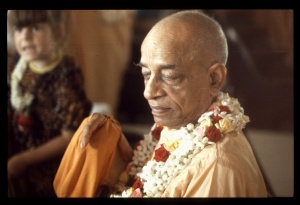SB 10.13.26: Difference between revisions
(Vanibot #0018 edit: make synonym terms in Sanskrit italic in SB - Vanisource) |
(Vanibot #0054 edit - transform synonyms into clickable links, which search similar occurrences) |
||
| Line 23: | Line 23: | ||
<div class="synonyms"> | <div class="synonyms"> | ||
''vraja-okasām'' | ''[//vanipedia.org/wiki/Special:VaniSearch?s=vraja&tab=syno_o&ds=1 vraja]-[//vanipedia.org/wiki/Special:VaniSearch?s=okasām&tab=syno_o&ds=1 okasām]'' — of all the inhabitants of Vraja, Vṛndāvana; ''[//vanipedia.org/wiki/Special:VaniSearch?s=sva&tab=syno_o&ds=1 sva]-[//vanipedia.org/wiki/Special:VaniSearch?s=tokeṣu&tab=syno_o&ds=1 tokeṣu]'' — for their own sons; ''[//vanipedia.org/wiki/Special:VaniSearch?s=sneha&tab=syno_o&ds=1 sneha]-[//vanipedia.org/wiki/Special:VaniSearch?s=vallī&tab=syno_o&ds=1 vallī]'' — the creeper of affection; ''ā-[//vanipedia.org/wiki/Special:VaniSearch?s=abdam&tab=syno_o&ds=1 abdam]'' — for one year; ''[//vanipedia.org/wiki/Special:VaniSearch?s=anu&tab=syno_o&ds=1 anu]-[//vanipedia.org/wiki/Special:VaniSearch?s=aham&tab=syno_o&ds=1 aham]'' — every day; ''[//vanipedia.org/wiki/Special:VaniSearch?s=śanaiḥ&tab=syno_o&ds=1 śanaiḥ]'' — gradually; ''[//vanipedia.org/wiki/Special:VaniSearch?s=niḥsīma&tab=syno_o&ds=1 niḥsīma]'' — without limit; ''[//vanipedia.org/wiki/Special:VaniSearch?s=vavṛdhe&tab=syno_o&ds=1 vavṛdhe]'' — increased; ''[//vanipedia.org/wiki/Special:VaniSearch?s=yathā&tab=syno_o&ds=1 yathā] [//vanipedia.org/wiki/Special:VaniSearch?s=kṛṣṇe&tab=syno_o&ds=1 kṛṣṇe]'' — exactly accepting Kṛṣṇa as their son; ''[//vanipedia.org/wiki/Special:VaniSearch?s=tu&tab=syno_o&ds=1 tu]'' — indeed; ''[//vanipedia.org/wiki/Special:VaniSearch?s=apūrva&tab=syno_o&ds=1 apūrva]-[//vanipedia.org/wiki/Special:VaniSearch?s=vat&tab=syno_o&ds=1 vat]'' — as it had not been previously. | ||
</div> | </div> | ||
Latest revision as of 18:23, 17 February 2024

A.C. Bhaktivedanta Swami Prabhupada
TEXT 26
- vrajaukasāṁ sva-tokeṣu
- sneha-vally ābdam anvaham
- śanair niḥsīma vavṛdhe
- yathā kṛṣṇe tv apūrvavat
SYNONYMS
vraja-okasām — of all the inhabitants of Vraja, Vṛndāvana; sva-tokeṣu — for their own sons; sneha-vallī — the creeper of affection; ā-abdam — for one year; anu-aham — every day; śanaiḥ — gradually; niḥsīma — without limit; vavṛdhe — increased; yathā kṛṣṇe — exactly accepting Kṛṣṇa as their son; tu — indeed; apūrva-vat — as it had not been previously.
TRANSLATION
Although the inhabitants of Vrajabhūmi, the cowherd men and cowherd women, previously had more affection for Kṛṣṇa than for their own children, now, for one year, their affection for their own sons continuously increased, for Kṛṣṇa had now become their sons. There was no limit to the increment of their affection for their sons, who were now Kṛṣṇa. Every day they found new inspiration for loving their children as much as they loved Kṛṣṇa.